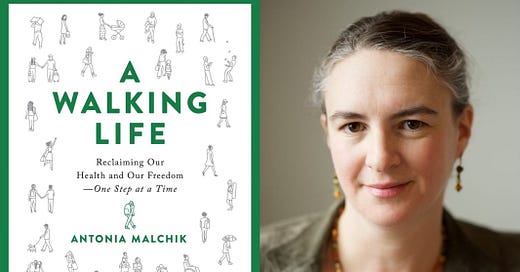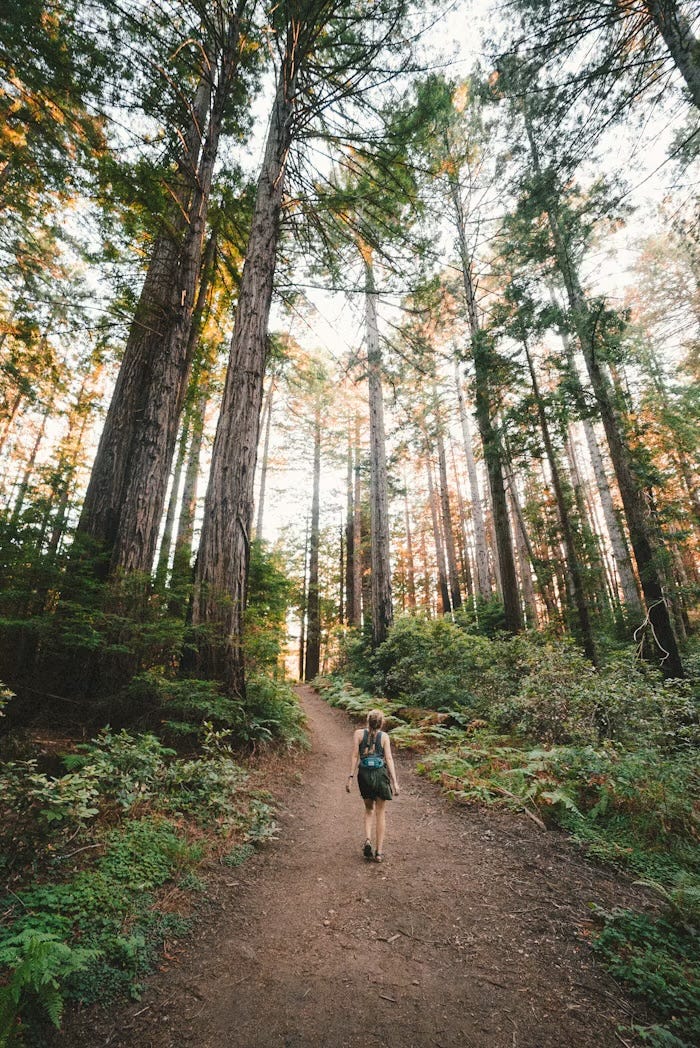If there’s one thing Antonia Malchik wants you to do after reading her book “A Walking Life: Reclaiming Our Health and Our Freedom One Step at a Time,” it’s to slip on your shoes—or maybe even go barefoot—and walk.
Anywhere. Everywhere. The act of walking, Malchik argues, is more than just putting one foot in front of the other; it’s a rebellion, a reconnection with our humanity, and perhaps our last defense against a world that's constantly trying to sit us down.
When I chatted with Antonia (or Nia, as she prefers) by phone and digital correspondence, I expected a conversation filled with facts and history about walking’s importance. What I got was much more—a journey through history, humor, and some hard truths about how walking is woven into the fabric of who we are.
If walking has been designed out of our lives, Nia is here to integrate it back in—boldly, humorously, and with just enough edge to make you lace up your sneakers and hit the pavement before you’re done reading.
“I’m going for a walk,” I begin, quoting from her book’s introduction. “You say it’s one of the most common phrases in the English language, but also one that signals everything from heartbreak to hope. What did you mean by that?”
Nia responds, as though she’s heard this question before. “Walking is woven into the stories we tell about ourselves,” she says.
“Whether you’re storming out of a fight or strolling hand in hand with someone you love, walking is the backdrop for so much of what makes us human. We’ve been walking for millions of years, but only recently—thanks to cars, computers, and a work culture obsessed with productivity—have we begun to forget its importance.”
Nia’s book is packed with stories about the human relationship with walking, from our evolution as bipedal beings to the political protests that have marched on two feet. It’s not just a self-help book. Rather, it’s a call to arms—or, rather, legs.
She isn’t shy about exploring the darker side of what happens when walking gets designed out of our cities, either. Our car-centric culture, Nia argues, has made us isolated, lonely, and unhealthy. The consequences, she says, are spiritual as well as physical.
“I mean, let’s face it,” she laughs. “You can’t meditate in traffic. But walking? There’s something about the act of walking—especially in green spaces—that brings a sense of peace. It’s meditative. You can process emotions, solve problems, have difficult conversations, and feel like you’re part of something bigger than yourself. Walking puts us in tune with ourselves and the world around us.”
Walking, Nia emphasizes, is a freedom many of us no longer recognize we’ve lost. In cities dominated by cars and designed for speed, the right to simply walk has been compromised. But this, she argues, can change. Walking, in its simplest form, is a way to reclaim our communities and even heal our fractured democracy.
“Walking together bridges gaps,” she explains, referencing research in the book that shows how even casual interactions with strangers can foster a sense of connection and empathy.
She continues:
“When you’re walking, you’re not hiding behind a screen or the wheel of a car. You’re face-to-face with people, with all their humanity on display. And it’s in these small moments—passing someone on the street, sharing a crosswalk, or walking alongside a neighbor—that you start to rebuild the community. Walking is an act of resistance against the isolation our modern world tries to impose on us.”
The discussion turns more serious when I ask her about the broader implications of walking. As we increasingly face political division, climate change, and societal burnout, can walking be part of the solution?
“Absolutely,” she says, without missing a beat.
“Walking grounds us. It literally puts us in motion, in connection with the earth. When we walk through natural spaces, we begin to understand our place in the ecosystem. You can’t walk through a forest or along a river and not feel responsible for protecting those spaces. The more we walk, the more we align ourselves with nature—and with each other.”
Unsplash Photo Credit: Kevin Wolf
Nia’s book doesn’t just make a case for walking as a health benefit or even a spiritual practice—it’s a manifesto for freedom. When we walk, she argues, we take control over our lives in a way that nothing else can offer.
“Walking is inefficient,” she says with a mischievous tone to her voice. “And that’s why it’s radical. We live in a world where efficiency is prized above all else. But walking is slow. It doesn’t get you anywhere fast, and it doesn’t make you more productive. It’s a break from the capitalist grind. When you walk, you can’t be tracked or quantified. There’s something subversive about that.”
Her comment takes me by surprise, but I quickly realize how much sense it makes. In a society obsessed with data and productivity, walking—especially without a destination or a step-counting app—is a way to push back. It’s an act of freedom, a way to declare that not every moment needs to be monetized or optimized.
We talk more about how walking could serve as a form of activism. From the Civil Rights marches to contemporary environmental protests, walking has always been a tool of resistance. Could walking together help us bridge the political and social divides that seem to widen every day?
“Maybe,” Nia says thoughtfully.
“But I think it starts with walking for yourself. Once you walk—once you feel the power of walking in your own life—you start to see how it can connect you to others. There’s something almost magical about the way walking can lower your defenses, calm your mind, and open you up to new ideas. When you’re walking, you’re in motion, but you’re also present. It’s the ultimate paradox.”
Nia has a way of making profound points without ever sounding preachy, and it’s this balance that makes her book so engaging. She doesn’t offer walking as a cure-all for society’s ills, but she does make a compelling case that it’s a crucial part of the solution. By the time we’re done talking, I’m already itching to get outside and take a walk myself.
As we wrap up the interview, I ask Nia what she hopes readers take away from “A Walking Life.” Her answer is as straightforward as it is inspiring.
“I just want people to walk,” she says. “Walk for your health. Walk for your community. Walk for the environment. Walk for freedom. Just walk.”
If ever there was a book that could make you want to drop everything and walk, it’s Antonia Malchik’s “A Walking Life.”
This is not just a book about walking—it’s about reclaiming something essential about being human, something we’ve lost in the rush to modernize and automate our lives. Nia’s writing is bold, humorous, and just a little bit subversive—much like walking itself.
As Nia says, “Walking is inefficient, and that’s why it’s radical.” So put down this article, slip on your shoes, and start walking. There’s a whole world—and maybe a little freedom—waiting for you out there.
Since January of 2020, Great Books, Great Minds has provided subscribers community, connection and conversation around books for free—no paywall.
But our future relies on you. At $6.00/month or $60.00 per year, please help me sustain our vision of impacting one million readers worldwide by 2030.
Diamond Michael Scott, Global Book Ambassador and Influencer









Grateful to you, Diamond-Michael, for this meeting of minds and footsteps!
Walk, walk, walk. Water, water, water. That’s the most important part of a long, happy, healthy life.